Climate Disrupts Florida Politics
Air Date: Week of October 25, 2024
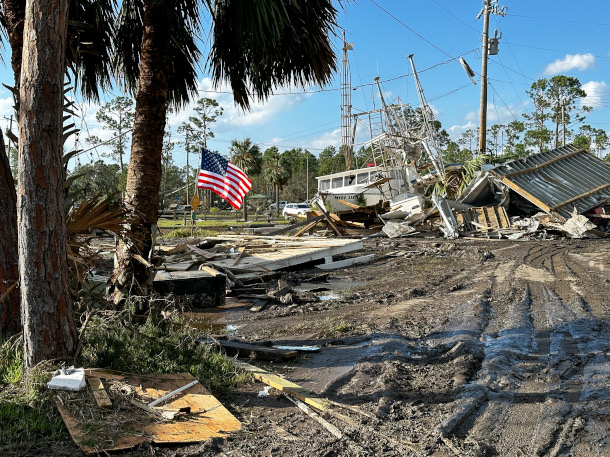
Hurricanes Helene and Milton hit Florida back-to-back. The above shows damage in Keaton Beach.(Photo: Staff Sgt. Jacob Hancock, U.S. Air National Guard Flickr, CC BY 2.0)
In this election year, hurricanes are part of the political conversation about climate change in Florida, where communities are still cleaning up from Helene and Milton. Inside Climate News reporter Amy Green joins Host Paloma Beltran to discuss how Florida’s candidates for U.S. Senator and Republican Governor Ron DeSantis are addressing climate change in the wake of these massive storms.
Transcript
DOERING: From PRX and the Jennifer and Ted Stanley Studios at the University of Massachusetts, Boston, this is Living on Earth. I’m Jenni Doering.
BELTRAN: And I’m Paloma Beltran.
As the U.S. elections on November 5th draw near, candidates in key Senate races are trying to make last minute appeals to voters, including in Florida. Republican incumbent Senator Rick Scott is facing a challenge from Democrat Debbie Mucarsel-Powell. Floridians are still cleaning up from hurricanes Helene and Milton. And in this election year, hurricanes are part of the conversation in politics about climate change in the Republican-led state. Amy Green is a reporter for our media partner, Inside Climate News and joins us now from Orlando. Welcome back to Living on Earth, Amy!
GREEN: It's nice to talk with you.
BELTRAN: So talk to me about Floridians' relationship to climate change. I mean, we have a state that's been absolutely pummeled by severe storms, and they're only getting worse. How do Floridians view climate change?
GREEN: You know, I think Floridians have a unique awareness of the environment, because so much of our lives here revolve around the environment. People are very into water activities and boating and swimming and fishing and hiking, and obviously, Florida is very uniquely vulnerable to climate change. And so it's probably no surprise that surveys show that Floridians, more than other Americans, believe that climate change is real, and they support government programs and actions to address it. A recent survey just came out last week from Florida Atlantic University, showing that 52% of respondents agreed that a candidate with a record of reducing climate impacts was more likely to get their vote. And 68% agreed that the state should do more to address climate impacts, and 67% agreed that the federal government should do more.
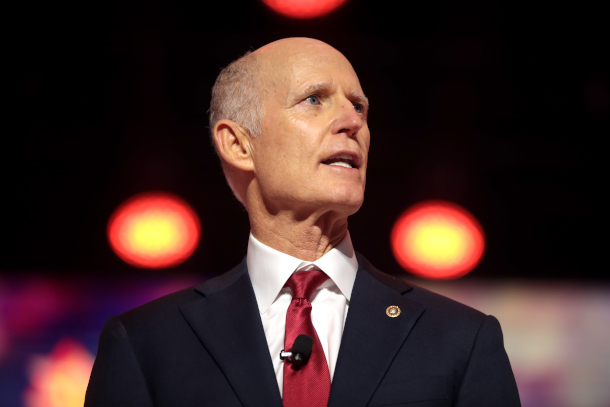
Incumbent Republican Senator Rick Scott. While Rick Scott has in the wake of recent hurricanes acknowledged climate change, he still casts doubt on its man-made causes. (Photo: Gage Skidmore, Flickr, CC BY-SA 2.0)
BELTRAN: You know, Amy, hurricanes Helene and Milton hit Florida back to back and caused catastrophic damage to the state. What's the general mood on the ground? And to what extent are you hearing a shift in public and political discourse about climate change after these storms?
GREEN: You know, people are exhausted. I think a lot of people are stunned, even people who were not heavily impacted, like myself. I think that the latest hurricanes, for sure, have elevated the issue of climate change in Florida politics at this juncture, leading up to the November elections, and in everyday discourse among Floridians who are trying to understand why these hurricanes are becoming so much more intense than they used to be, why they feel more frequent, and as we know, the reasons for that are climate related. Warmer water temperatures can lead to a phenomenon that's becoming more common because of climate change, which is this rapid intensification of hurricanes, where they can grow almost overnight from tropical depression or tropical storm to a large category 3, 4, 5 hurricane. Sea level rise is causing storm surges to be more damaging. And so that is a conversation that is taking place in the state, for sure. I don't see it changing the minds of the Republican leadership in the state in a drastic way. And for example, after Hurricane Milton, Governor Ron DeSantis, himself a Republican, was asked to comment on some of this misinformation that has circulated after Hurricane Helene, especially in North Carolina, like government intentionally started these hurricanes and directed them into red states, other misinformation circulating on social media has been that FEMA aims to take away people's homes and demolish these homes. We know that this is not true, but Governor Ron DeSantis was asked to comment on this information, and he seemed to, in his answer, downplay climate change somewhat. He said, quote, you see it on both sides, in response to the disinformation. He said, quote, some people think government can do this, and others think it's all because of fossil fuels. He said, what the reality is is what we can see, which is the fact that it's hurricane season, and so it's not surprising that we would have hurricanes during hurricane season. And he talked about hurricanes going back through history, dating back to the 1800s and seemed to be saying that we've always had hurricanes, and the role of climate change in that phenomenon was minimal.
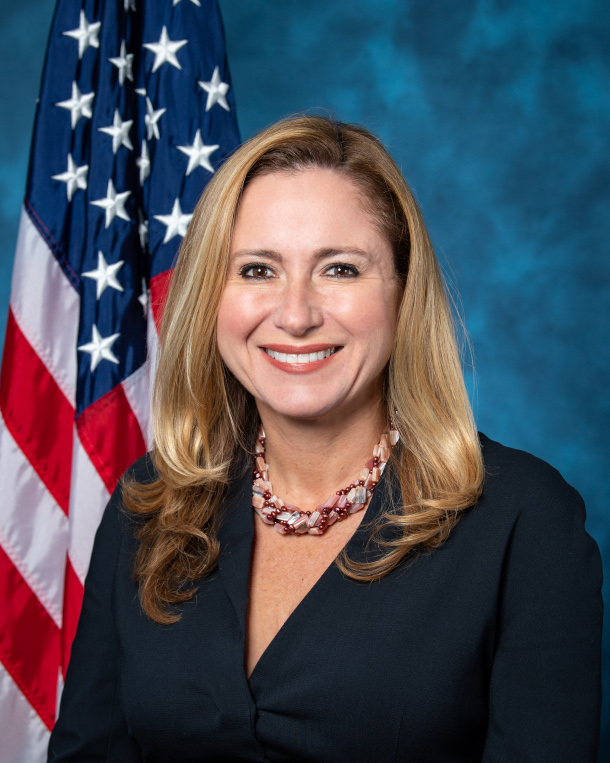
Democratic challenger Debbie Mucarsel-Powell is a former Congresswoman. She has emphasized the importance of government buyouts for communities existentially threatened by climate change. (Photo: United States Congress, Wikimedia Commons, Public Domain)
BELTRAN: And from what I understand, Florida Senate race is tightening. What are the two candidates records on climate change? And in your view, how much is the aftermath of these storms affecting the way each of them approach this issue?
GREEN: Right, yes. So that race is tightening. The incumbent, Rick Scott, is a Republican. He is facing a formidable challenge from Democrat Debbie Mucarsel-Powell, who is a former Congresswoman. Rick Scott was elected governor of Florida as a Tea Party candidate in 2010 and as governor, he focused his administration pretty narrowly on jobs, and when it comes to the environment, he really gutted environmental programs like Florida Forever, which is the State's land conservation program, and probably most notably, he reportedly banned the words "climate change" from government agencies, and instituted a policy where that language was not supposed to be used in official documents and official settings and things like that. And that kind of made him a punchline of late-night comedians in a state that is, you know, so obviously vulnerable to climate change. And as a senator, he voted against the inflation Reduction Act, which of course, was the Biden administration's massive investment in climate change programs, programs aimed at moving the country toward cleaner energy sources. But in recent years, his language has appeared to change somewhat on the issue of climate change. His campaign sent me an Op Ed that he wrote back in 2019 where he talked about climate change as an issue that was real and important for the state of Florida. At the same time, the Op Ed criticized the Green New Deal, which involved programs aimed at addressing climate change. And since Hurricane Helene, he did an interview with CNN where, again, he talked about climate change as something that was real and something that deserved to be addressed by state policies that would be aimed at rebuilding infrastructure in a more resilient way.
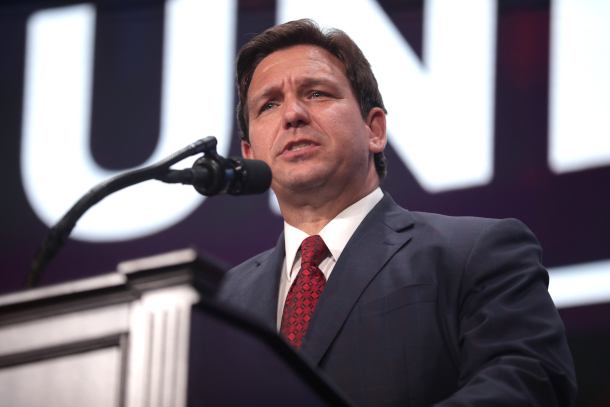
Republican Governor Ron DeSantis has implemented programs like Resilient Florida to help Florida better prepare for disasters. However, he has also downplayed the human role in causing climate change. (Photo: Gage Skidmore, Flickr, CC BY-SA 2.0)
SCOTT: You know, who knows what the reason is, but something is changing, massive storms, massive storm surge. So we've got to figure this out. But here's, here's the positive. We're going to do it. We're going to build more resiliently. We're going to come back. I live in a most wonderful state with wonderful people that are very resilient.
BELTRAN: And what about his opponent, Democrat, Debbie Mucarsel-Powell?
GREEN: When I interviewed Mucarsel-Powell a couple weeks ago, she talked to me about how one of her greatest concerns when it comes to climate change are communities that are existentially vulnerable to impacts like sea level rise, communities where it will be very difficult to rebuild and continue to exist in the future.
MUCARSEL-POWELL: You know, the expectation of the sea level rise was so high that it was having conversations with homeowners that you may not be able to rebuild, but you may have to really seriously consider moving out of this area. And these are families that have been living in the same house for decades, so I think that's the one of the most alarming, alarming situations that we're facing.
GREEN: And she talked to me about the government role in issues like that, being one where the government can offer buyouts to help Floridians move to less risky areas.
BELTRAN: Now, Amy, how do you think hurricanes will continue to impact politics in Florida moving forward?
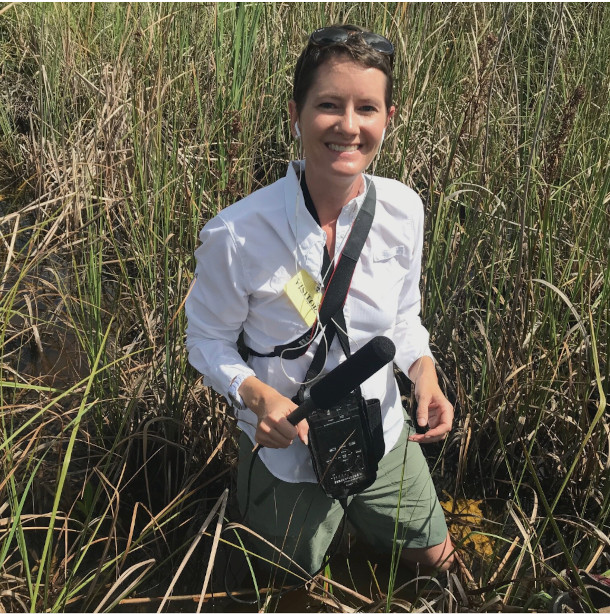
Amy Green is a reporter for Inside Climate News based in Orlando, Florida. (Photo: Tony Pernas)
GREEN: I think there will be this continued tension over the government's role in addressing fossil fuels, which are responsible for hastening the warming of the global climate. Governor Ron DeSantis has done more on climate change than his predecessor, Rick Scott, for sure, Ron DeSantis has initiated a large program called Resilient Florida, and this is a program that is designed to fortify the state's infrastructure against flooding, sea level rise, more damaging storms, and it has been a successful program in that it has provided incentives for communities to begin conversations about, you know, what infrastructure is important to save, and that has been a good thing. But DeSantis has not done anything to move the state toward cleaner energy. One of the things Democrats raised concerns about in the days after Hurricane Milton was Governor Ron DeSantis's turning down federal funding to address things like greenhouse gas emissions, car emissions, basically passing on federal funding that would help the state make improvements in those areas. And I think that will continue to be a source of contention in Florida between Democrats and Republicans.
BELTRAN: Amy Green is a reporter with Inside Climate News. Thanks so much for joining us.
GREEN: It's always a pleasure to chat with you.
Links
Inside Climate News | “In Florida Senate Race, Two Vastly Different Views on Climate Change”
Living on Earth wants to hear from you!
Living on Earth
62 Calef Highway, Suite 212
Lee, NH 03861
Telephone: 617-287-4121
E-mail: comments@loe.org
Newsletter [Click here]
Donate to Living on Earth!
Living on Earth is an independent media program and relies entirely on contributions from listeners and institutions supporting public service. Please donate now to preserve an independent environmental voice.
NewsletterLiving on Earth offers a weekly delivery of the show's rundown to your mailbox. Sign up for our newsletter today!
 Sailors For The Sea: Be the change you want to sea.
Sailors For The Sea: Be the change you want to sea.
 The Grantham Foundation for the Protection of the Environment: Committed to protecting and improving the health of the global environment.
The Grantham Foundation for the Protection of the Environment: Committed to protecting and improving the health of the global environment.
 Contribute to Living on Earth and receive, as our gift to you, an archival print of one of Mark Seth Lender's extraordinary wildlife photographs. Follow the link to see Mark's current collection of photographs.
Contribute to Living on Earth and receive, as our gift to you, an archival print of one of Mark Seth Lender's extraordinary wildlife photographs. Follow the link to see Mark's current collection of photographs.
 Buy a signed copy of Mark Seth Lender's book Smeagull the Seagull & support Living on Earth
Buy a signed copy of Mark Seth Lender's book Smeagull the Seagull & support Living on Earth

